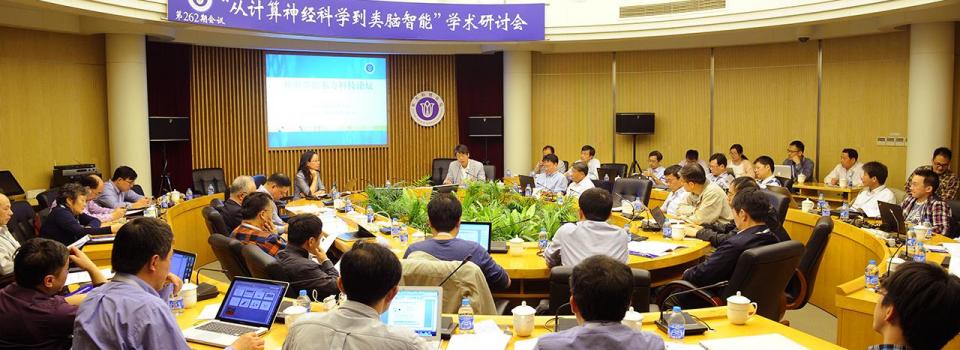Oct 19 2015
Published by
NYU Shanghai

October 12-13, 2015 - NYU Shanghai successfully organized the 262th Eastern Forum of Science and Technology, jointly sponsored by the Shanghai Municipal Government, the Chinese Academy of Sciences, and the Chinese Academy of Engineering. This influential forum, which took place at Shanghai’s Huxing Science and Technology Library, is the second such event organized by NYU Shanghai.
About 60 experts from systems/computational neuroscience and machine learning/AI participated in the meeting’s lively discussions. They agreed that understanding human intelligence and emulating it with machines are a great challenge for the 21st century, with considerable potential for the economy and society. To secure China’s global leadership in this tremendously exciting field, the forum recommended the establishment of new infrastructure and funding mechanisms to support cross-disciplinary collaborations and train young talents from Physics, Engineering, Mathematics and Computer Science, as well as Biology and Psychology.
Themed “From Computational Neuroscience to Brain-inspired Intelligence”, the by-invitation-only forum attracted top scholars in the fields of computational neuroscience, neurobiology, machine learning, brain computer interface, artificial intelligence, advanced computing and other related disciplines. The Forum was co-chaired by Xiao-Jing Wang, Associate Vice Chancellor for Research at NYU Shanghai and Professor of Neural Science at New York University, Professor Zhaohui Wu, President of Zhejiang University, and Professor Si Wu from State Key Lab of Cognitive Neuroscience & Learning, Beijing Normal University.
Academicians Xiongli Yang from Fudan University, and Aike Guo from Institute of Neuroscience, Chinese Academy of Sciences took active parts in the forum. Other participants included eminent scholars from elite research institutions, including Tsinghua University, Peking University, Zhejiang University, Fudan University, University of Science and Technology of China, Shanghai Jiao tong University, East China Normal University, Beijing Normal University, Nankai University, National Supercomputer Center in Tianjin, Institute of Neuroscience, Chinese Academy of Sciences, Institute of Automation, Chinese Academy of Sciences etc.
Computational neuroscience is drawing increasing attention, because as technological advances are producing big data, new theory and mathematical models are needed to help make sense of the information and uncover general principles of how the brain works. Also, while brain-like machine intelligence holds huge promise, there is still a large gap between brain science and artificial intelligence, and computational neuroscience provides a powerful bridge between the two fields.
Last year, NYU Shanghai successfully organized the 249th Eastern Forum of Science and Technology “Language and the Function of Prefrontal Cortex,” which revealed new insights into the research of neuroimaging, computational neuroscience etc. The prefrontal cortex, often called the CEO of the brain, is a quintessential “cognitive-type” cortical area. The 262nd Eastern Forum emphasized cognitive abilities underlying intelligence. This kind of ongoing dialog facilitates and fosters interdisciplinary exchanges on topics related to neuroscience and artificial intelligence research

About Eastern Forum of Science and Technology
The Eastern Forum of Science and Technology (EFST) is jointly initiated and sponsored by the Shanghai Municipal Government, the Chinese Academy of Sciences (CAS) and the Chinese Academy of Engineering (CAE). The Forum is a comprehensive and strategic symposium of Sciences and Technology that aims to engage scientists, technologists and engineers.


